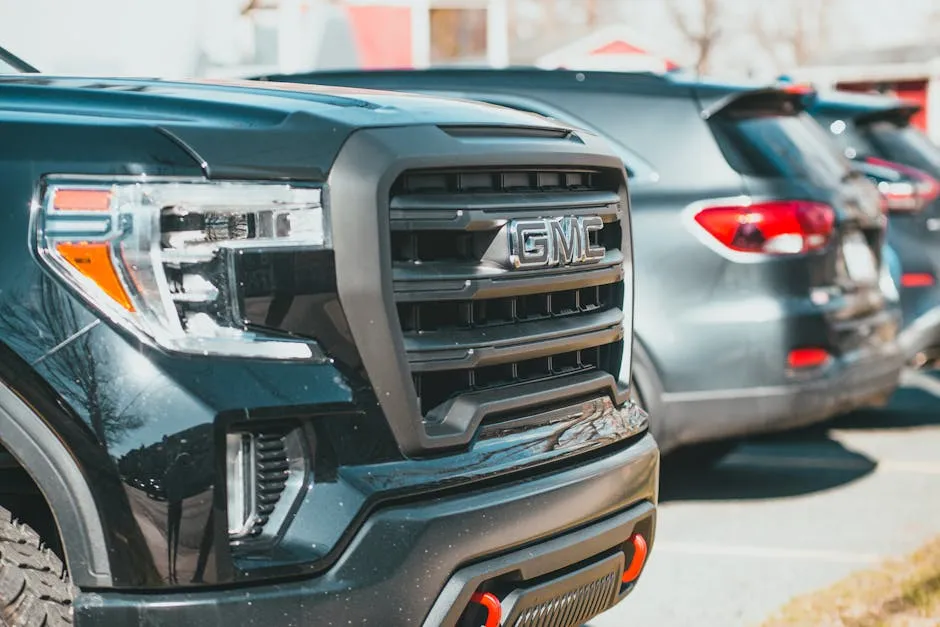
Why Is GMC Unreliable? An In-Depth Analysis
Introduction
In the automotive world, few brands ignite as much conversation as GMC. Renowned for their sturdy trucks and SUVs, GMC has cultivated a dedicated fan base over the years. Yet, murmurs of unreliability cast a shadow over their otherwise solid reputation. Are these worries founded, or just the result of a handful of misfortunes? We’re about to take a closer look at the core of GMC’s reliability concerns, weaving in owner experiences and expert insights. Buckle up as we sift through the data, anecdotes, and expert opinions that illuminate why some folks view GMC vehicles as unreliable.
The chatter often revolves around owner feedback, where experiences vary widely. Some drivers rave about the performance and features, while others lament frequent repairs. Industry reliability ratings from trusted sources like J.D. Power and RepairPal help frame GMC’s standing against its competitors. Moreover, common issues such as electrical glitches and transmission troubles continue to surface in discussions about GMC models.
Cost of ownership adds another layer to the conversation. Maintenance expenses can pile up, impacting long-term satisfaction and financial commitment. As we compare GMC’s reliability to brands like Ford and Toyota, it becomes clear that there are both strengths and weaknesses. Automotive experts weigh in on GMC’s engineering practices, offering insights into how these may contribute to the reliability concerns.
If you own a GMC vehicle, having the right tools for maintenance is essential. For instance, an Automotive Repair Manual for GMC Vehicles can be a lifesaver, guiding you through troubleshooting and repairs with detailed instructions and diagrams. Who wouldn’t want to feel like a DIY mechanic from the comfort of their garage?
Lastly, we’ll touch on GMC’s future endeavors to enhance their reliability ratings in upcoming models. This journey through the complexities of GMC’s reliability will arm potential buyers with the knowledge they need to make informed decisions. Whether you’re a loyal GMC fan or a curious onlooker, prepare for a ride filled with insights on why GMC vehicles might not always live up to the hype.

Understanding GMC’s Reliability Issues
Historical Context of GMC Reliability
GMC has had a rollercoaster ride regarding its reputation for reliability. Founded in 1901, the brand initially thrived on producing durable trucks for industrial use. Over the decades, GMC’s image evolved, transitioning from a workhorse brand to a premium vehicle manufacturer, catering to a more diverse audience. This shift brought luxurious trims and advanced features, but it also introduced complexities that sometimes overshadowed their reliability.
Consumer perceptions have been influenced by various factors. In the early 2000s, GMC faced criticism for the reliability of its SUVs and trucks. Reports of engine failures and electrical glitches led to a tarnished image. However, as new models emerged, such as the GMC Sierra 1500, there was a noticeable improvement in reliability ratings. Yet, the echoes of past issues lingered, creating skepticism among potential buyers.
Additionally, the ever-changing landscape of automotive technology has impacted GMC’s reputation. With the rise of electric and hybrid vehicles, GMC had to adapt quickly. This brought about new challenges in engineering and manufacturing processes, which sometimes resulted in reliability concerns.
Common Problems Reported by Owners
Electrical Problems
Electrical issues rank high on the list of complaints from GMC owners. Many drivers report problems with the infotainment systems, including unresponsive screens and Bluetooth connectivity issues. Others face more serious problems, such as battery drains and malfunctioning dashboard displays. These electrical gremlins have caused frustration, leading to repeated trips to the mechanic.
Transmission Failures
Transmission problems are another common headache. Certain GMC models, especially older ones like the Terrain and Acadia, have faced reports of premature transmission failures. Owners often describe slipping gears and erratic shifting, impacting their driving experience. The implications can be costly, as transmission repairs can run into thousands of dollars, leaving drivers feeling stuck—both financially and literally.
Consider investing in a Bluetooth OBD2 Scanner for Vehicle Diagnostics. This handy tool can help you diagnose issues before they escalate, saving you time and money. Plus, you’ll impress your friends with your newfound mechanic skills!
Engine Concerns
Engine problems can be the most daunting for GMC owners. Reports of excessive oil consumption and timing chain issues have surfaced, particularly with the 3.6-liter V6 engine. Some vehicles experienced significant drops in performance, leading to anxiety about potential engine failure. Recalls related to these issues have added to GMC’s reliability woes, making some potential buyers think twice.

Consumer Reports and Ratings
Consumer reports and professional reviews often highlight the reliability of GMC vehicles. According to J.D. Power, GMC’s overall reliability score stands at 85 out of 100. This rating positions GMC in the middle of the pack compared to other brands. The GMC Sierra 1500, for instance, ranks third out of 17 full-size trucks on RepairPal, with an impressive rating for affordability and infrequency of repairs.
However, GMC has seen fluctuating reliability rankings over recent years. While there have been improvements, some models still struggle. For example, despite strong sales, certain GMC SUVs and trucks have garnered complaints about electrical issues and transmission failures. These problems cast a long shadow over GMC’s reputation, causing concern among potential buyers.
Statistics from these reports reveal that the chance of a major repair by the tenth year is around 26.25%. This figure can raise eyebrows, especially for individuals looking to invest in long-term ownership. GMC’s performance varies across models, with some performing better than others. The Sierra 1500, for instance, has a dedicated fan base, yet still faces scrutiny regarding reliability.
In summary, while GMC has made strides in reliability, consumer reports suggest there’s still work to be done. Prospective buyers should weigh these ratings carefully when considering a purchase. And while you’re at it, why not ensure you’re prepared for any roadside mishaps with an Emergency Roadside Kit? You never know when you might need a jump starter or a reflective triangle!

Cost of Ownership
Average Repair Costs
Owning a GMC vehicle can be a mixed bag regarding maintenance costs. On average, the annual repair cost for GMC vehicles hovers around CAD $935. This figure places GMC in a competitive position against rivals like Chevrolet. However, as vehicles age, these costs can increase significantly. By the tenth year, the likelihood of encountering a major repair rises to 26.25%, which can take a toll on your wallet.
Some GMC owners have reported spending thousands on transmission repairs alone. These unexpected expenses can leave drivers feeling frustrated and financially strained. Compared to brands like Toyota, which boasts lower repair costs and frequencies, GMC’s long-term ownership costs can feel daunting.
When assessing the total cost of ownership, it’s essential to consider potential repairs alongside regular maintenance. A vehicle that requires frequent fixes can quickly become an expensive proposition. For buyers eyeing a GMC, understanding these long-term financial impacts is crucial in making an informed decision. And speaking of maintenance, don’t forget to grab some Engine Oil for GMC Vehicles to keep your engine running smoothly!

Warranty and Coverage
GMC offers a standard warranty that includes a three-year/36,000-mile basic warranty and a five-year/60,000-mile powertrain warranty. While these terms align with industry standards, they may not be as comprehensive as some competitors. For instance, brands like Hyundai provide longer warranties, which can enhance owner confidence.
Common warranty claims associated with GMC vehicles often revolve around electrical issues and engine concerns. These claims can significantly impact owner satisfaction, as frequent repairs under warranty may lead to frustration. If a vehicle is in the shop more than on the road, it can sour the ownership experience.
In light of these factors, GMC’s warranty offerings are adequate, but they may not provide the peace of mind some buyers seek. Evaluating these warranties against the backdrop of reliability issues can inform potential buyers about what to expect in their ownership journey. Ultimately, understanding both the warranty and the common claims can help GMC owners navigate their vehicle’s longevity with greater ease. And hey, while you’re at it, why not consider getting a Car Battery Charger? It’s a handy tool to have in case your battery decides to take a nap!

Owner Experiences
Positive Reviews
GMC owners often express satisfaction with their vehicles. One happy owner shared, “My Sierra 1500 has been a reliable workhorse!” Many appreciate the powerful engine options and towing capabilities. The 6.2L V8 engine, for instance, is a favorite among those needing serious muscle for hauling.
Comfort is another highlight. Owners rave about the luxurious interiors, especially in higher trims like the Denali. One user mentioned, “I feel like I’m driving a luxury SUV!” Features like heated seats and an intuitive infotainment system enhance the driving experience.
Safety ratings also play a significant role in owner satisfaction. GMC’s commitment to safety shines through with advanced features like lane departure warning and automatic emergency braking. Many owners feel secure, knowing their vehicle is equipped to handle unexpected situations.
Of course, there’s the aesthetic appeal. GMC trucks and SUVs boast a rugged yet refined design that stands out on the road. One owner quipped, “I love the looks I get driving my GMC!” This blend of style and performance keeps many owners loyal to the brand.

Negative Reviews
Despite the positives, not all experiences are rosy. Some owners voice dissatisfaction due to reliability issues. One frustrated Sierra driver lamented, “I’ve spent more time in the shop than on the road!” Common complaints include frequent electrical problems and transmission failures.
The psychological impact of these reliability issues can be significant. Constant repairs can lead to frustration and anxiety. One owner reflected, “It feels like I’m always waiting for the next big problem.” This stress can overshadow the enjoyment of owning a GMC.
Owner reviews often highlight specific models with reliability concerns. The Acadia and Terrain have garnered negative feedback due to repeated visits to the mechanic. One owner expressed, “I loved my GMC until it started breaking down on me.” Such experiences can sour customer loyalty.
The financial implications are another concern. Repair costs can add up, leaving owners feeling financially strained. One owner stated, “I never expected my GMC to be this expensive to maintain!” This financial burden can make prospective buyers second-guess their choice. Consider investing in a Car Detailing Kit to keep your investment looking sharp and minimize depreciation!

Future Improvements
New Models and Innovations
GMC is aware of its reliability challenges and is actively working on improvements. Upcoming models are set to feature enhanced engineering practices. For instance, the introduction of more robust transmission systems aims to address past concerns. GMC plans to incorporate advanced materials that increase durability while reducing weight.
Additionally, new models will boast cutting-edge technology to help prevent issues before they arise. Features like predictive maintenance alerts are designed to keep owners informed about potential problems. This proactive approach can significantly enhance owner confidence in their vehicles.
GMC is also focusing on rigorous testing protocols. New models will undergo extensive reliability testing before hitting the market. This commitment to quality assurance aims to ensure that customer satisfaction aligns with performance expectations.
Incorporating feedback from dissatisfied owners is crucial for GMC. The brand is actively seeking input to refine its designs and features. By listening to customers, GMC hopes to foster loyalty and trust among potential buyers. And while you’re waiting for those new models, don’t forget to keep your current ride cozy with a Windshield Sun Shade to protect your interior from the blazing sun!

Consumer Expectations
As we look toward the future, consumer expectations are evolving. Buyers today prioritize reliability and low maintenance costs. GMC must rise to these expectations to remain competitive. Transparency in marketing about reliability will be essential in building trust.
Potential buyers want assurances that their investment will be worthwhile. GMC’s commitment to addressing reliability concerns could be a game-changer. As the brand implements improvements, it’s crucial for marketing to highlight these advancements.
Overall, GMC is on a path to enhance reliability. Investing in new technologies and listening to owner feedback can help reshape perceptions. By focusing on consumer needs, GMC aims to secure its place in the competitive automotive market. And don’t forget, a Car Fridge Cooler can make your road trips even more enjoyable!

FAQs
What are the most common reliability issues with GMC vehicles?
Common problems include electrical glitches and transmission failures. Owners frequently report issues with infotainment systems and premature transmission failures in certain models.
How does GMC’s reliability compare to other brands?
GMC often ranks in the middle when compared to competitors like Ford and Toyota. While some models perform well, others struggle with reliability ratings, affecting overall owner satisfaction.
Are GMC vehicles worth the investment despite reliability concerns?
Many GMC vehicles offer strong features and performance. However, potential buyers should consider the long-term costs associated with repairs and maintenance before making a decision.
What steps is GMC taking to improve reliability?
GMC is focusing on better engineering practices and customer feedback. The brand is actively working on new models to enhance reliability and address past issues highlighted by owners.
Conclusion
In conclusion, while GMC has its strengths, it cannot escape the scrutiny of reliability concerns that have plagued its reputation. From electrical issues to transmission failures, the experiences of owners paint a complex picture. Many drivers appreciate the power and features, but reliability issues linger like a bad smell after a family barbecue.
Despite the challenges, GMC is not sitting idle. The brand is actively working to improve reliability and address past shortcomings. New engineering practices and technologies are being implemented in upcoming models. This proactive approach could reshape the perception of GMC vehicles.
However, potential buyers should weigh these factors carefully. It’s essential to understand both the criticisms and the advancements before making a decision. A GMC might be a perfect fit for some, but others may find themselves in the repair shop more than on the road.
Ultimately, informed buyers are empowered buyers. By focusing on both the pros and cons, you can make a choice that aligns with your needs. Whether you’re a loyal fan or a hesitant shopper, understanding GMC’s reliability landscape is key to your decision-making process. And if you’re looking for some handy gadgets to keep your car organized, check out a Car Organizer for Back Seat to keep the chaos at bay!
For insights into why some consider GMC vehicles unreliable, check out this article on why is gmc unreliable.
Please let us know what you think about our content by leaving a comment down below!
Thank you for reading till here 🙂
All images from Pexels




